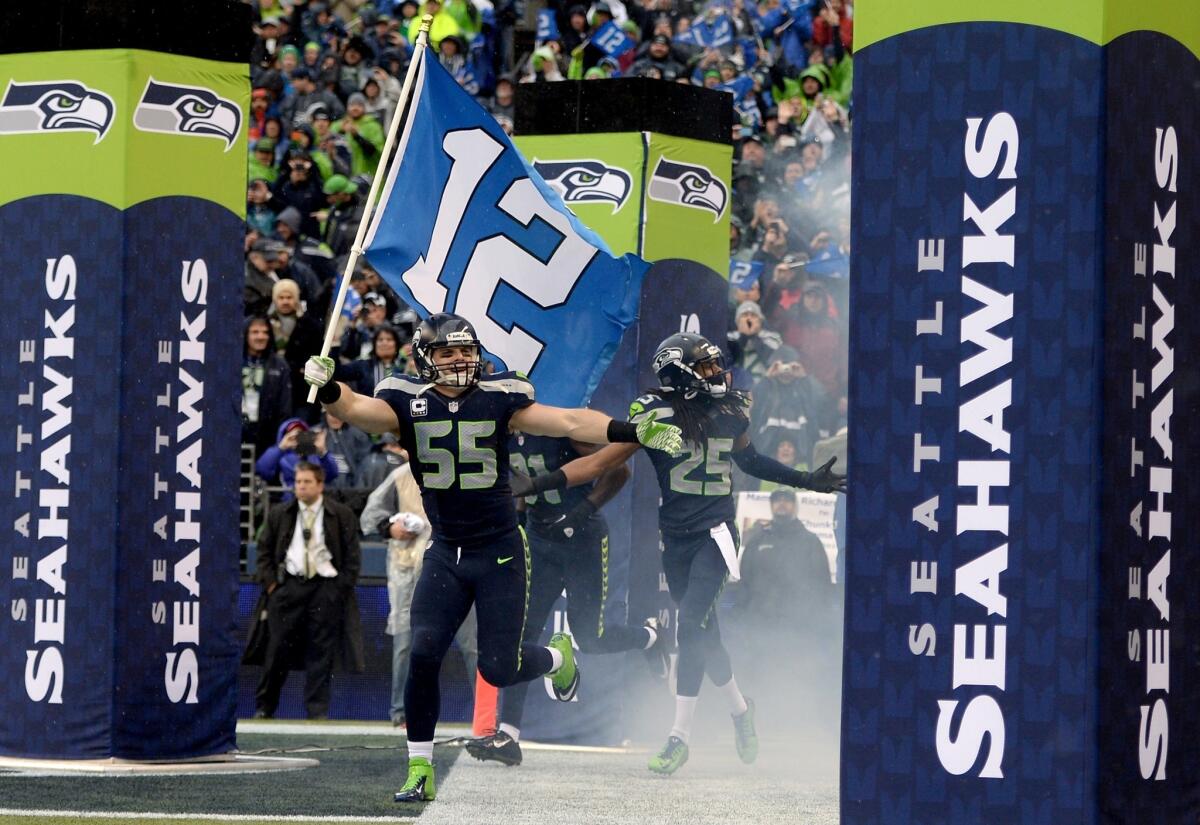New NFL rules are for the birds

- Share via
FROM SEATTLE — Raising the big blue flag is tradition for the Seattle Seahawks.
Causing the little yellow ones to drop could be tradition too.
As the Seahawks head into Thursday night’s season opener against the Green Bay Packers — the festivities start with the raising of the 12th Man flag — there’s a lot of speculation that the NFL’s heightened emphasis on illegal-contact penalties could significantly impact ultra-physical defenses such as Seattle’s.
“It’s the Legion of Boom rule, everyone knows that,” Seattle safety Earl Thomas said last month, referring to the nickname of the vaunted Seahawks secondary, which played a huge role in the team’s shutting down Denver’s top-ranked offense in the Super Bowl.
Actually, officials plan to crack down this season on three infractions: illegal contact, defensive holding and illegal hands to the face.
Of those, the sharpened focus on illegal contact has caused the biggest stir this summer, and has defensive backs concerned that officials will have a hair trigger when it comes to throwing flags.
“It’s a little frustrating,” Steelers cornerback Cortez Allen told the Pittsburgh Post-Gazette recently. “I have to admit that. It puts more emphasis on cleaner technique and things like that. It’s something we have to deal with.”
If the quarterback is in the pocket — and that’s an important distinction — a defensive player cannot initiate contact with a receiver once they are five yards past the line of scrimmage, except using his hands to defend against a collision.
In previous years, the NFL rule book specified that a defender could not initiate contact “that redirects, restricts or impedes a receiver in any way.”
The league dropped that language and said the defender cannot initiate contact, period. Though that might seem like a subtle distinction, tweaking the rule that way removes mitigating circumstances and almost certainly will lead to more flags.
“I anticipate more flags, more points, more yards, all of that — and longer games,” said Mike Pereira, the league’s former head of officiating who now works as a Fox analyst.
The exhibition season reflected that, and the statistics are startling. According to the NFL, there were 97 illegal contact calls compared to 10 last year; 165 defensive holding penalties, compared to 39, and 212 illegal use of hands calls, compared to 28.
“I did see it taper off a little bit in the fourth preseason game,” ESPN’s Jon Gruden said. “But I think it will be a detriment to teams like Seattle that play a lot of press coverage. I can’t imagine that being called like it was in the preseason.”
The NFL put the illegal-contact rules in place in 2004 to help goose the scoring and yardage numbers. But those haven’t been a problem lately. In fact, the league set records last season with 11,985 points scored (a combined average of 46.8 points per game) and 1,338 touchdowns that surpassed the previous record of 1,297 from the year before.
The impetus, Pereira said, was the NFL “had a declining number of illegal contact penalties that were called, and a rising number of inquiries from clubs as to why illegal contact wasn’t called on specific plays, coaches’ questions that were sent in during the week.”
The Seahawks, with their big defensive backs and hands-on approach, have fielded complaints before about their style of play.
New Orleans tight end Jimmy Graham said on the “Mike and Mike in the Morning” radio show that Seattle often roughs up opposing receivers, knowing that they’ll occasionally get flagged but more often can get away with it.
“They’re the type of team that they’re very, very aggressive,” said Graham, who had a combined four catches for 50 yards in two games against the Seahawks last season. “I think they teach, ‘Listen, they’re not going to call [pass interference], so just grab and hold as much as you can.’”
Richard Sherman, the All-Pro cornerback for Seattle, has suggested that the league is interested in giving offenses an additional edge to pump up fantasy-football numbers. He defended the Legion of Boom.
“We were playing by the rules before and we continue to play by the rules,” he said. “Every now and then, you get tangled up and you get hit by illegal contact.… But for the most part, I think we try to play within the rules and play within the scheme. We are happy that the emphasis is there because it will give people less excuses.”
Pereira, for one, has his concerns about fairness.
“With illegal contact, it’s only a foul if the quarterback is in the pocket,” he said. “So pocket-passing teams would stand to benefit more because the quarterback spends more time in the pocket. So the [Peyton] Mannings, the [Tom] Bradys, and those guys that are pocket passers and not necessarily fleet of foot would stand to benefit more than the [Colin] Kaepernicks and the [Russell] Wilsons who are mobile and like to run and get out of the pocket.
“Once they get out of the pocket, illegal contact rules are off. So to me it’s a little bit of an unfair point of emphasis in that respect. I think it will benefit some teams more than others.”
Asked if the point of emphasis will change his game, Sherman said, “Obviously not.”
In this town, painted Seahawks blue and green, there’s no appetite for adding yellow to the color scheme.
More to Read
Go beyond the scoreboard
Get the latest on L.A.'s teams in the daily Sports Report newsletter.
You may occasionally receive promotional content from the Los Angeles Times.











